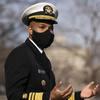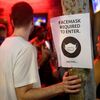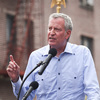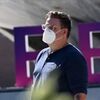
Dr. Leana Wen is in favor of the COVID-19 vaccine mandates. “I don’t think people should have the option of infecting others with a potentially fatal and extremely contagious virus,” he says. Wen is pictured above in the emergency department at Brigham and Women’s Hospital in Boston on August 14, 2012.
Steven Senne / AP
hide legend
toggle subtitle
Steven Senne / AP

Dr. Leana Wen is in favor of the COVID-19 vaccine mandates. “I don’t think people should have the option of infecting others with a potentially fatal and extremely contagious virus,” he says. Wen is pictured above in the emergency department at Brigham and Women’s Hospital in Boston on August 14, 2012.
Steven Senne / AP
Dr. Leana Wen advises you to think of your COVID-19 vaccine as a very good raincoat: is it drizzling or is it in a storm? You are well protected. “But if you’re in and out of thunderstorms every day and now there’s a hurricane, at some point you’re going to get wet,” he says.
That’s one of the reasons Wen, an ER physician and former Baltimore health commissioner, believes the CDC ended masking requirements too abruptly and prematurely in May, especially now that the highly transmissible delta variant is so prevalent in the US Health experts have urged the CDC to revise its guidance, which the agency is expected to do on Tuesday.


“Unfortunately, we are now in a situation where the vaccinated have to pay the price for the shares of the unvaccinated …”, he says. Although it is very, very rare for vaccinated people to become seriously ill with COVID-19, breakthrough infections are occurring, he says, “not because vaccines are not effective, but rather because of the high levels of unvaccinated and infected people who yes they are. that surrounds us. “
Wen serves as a medical analyst for CNN and contributing columnist by The Washington Post. In your new memories, Lifelines: A Doctor’s Journey in the Fight for Public Health, describes the extraordinary path that led her to her current career.
Wen spent the first years of his life in Shanghai. During the Cultural Revolution, his father spent time in prison for his work as a dissident. When she was almost eight years old, she and her father came to the United States to reunite with her mother, who had moved to Utah on a visa to attend graduate school.
His father was able to obtain political asylum in the United States, but the family had little money and Wen had severe asthma. The family’s dependence on Medicaid and the public health system inspired her to pursue a career in emergency medicine and public health.
Today, he has raised concerns about the way the CDC and the Biden administration have handled communications about the coronavirus with the public.
“Public health depends on public trust,” he says. “Public health depends on winning hearts and minds. It is not enough to have a good policy, you have to convince people to follow it.”
Wen believes that most of the people who have not yet received the COVID-19 vaccine are not completely opposed to vaccines, they are just people who are more concerned about the vaccine than the virus. But vaccine mandates have worked in the past, she says – just look at childhood vaccines and mandatory flu shots for healthcare workers, and the same approach can work for COVID.
“We really need to talk about the COVID vaccine in the same way that we talk about other vaccines, which is safe, effective, lifesaving and essential for public health.”
Interview highlights
On the lifting of the mask mandate by the CDC in May
It was a mistake for them to lift their guide in May. … Many of us in public health were very concerned that the CDC relied on an honor system at a time when many people, sadly, were not behaving in the most honorable way. …
When that guide was first issued, only 36% of the country was fully vaccinated. And we’re actually seeing the consequence now, which is that the unvaccinated started behaving like they were vaccinated, and now we’re seeing massive increases again across the country …
Hoping that the Biden administration will implement the vaccine mandates.
I hope that the Biden administration at this point is really behind the vaccine mandates, because we have to recognize that what we are doing so far is simply not working. I don’t think people should have the option of infecting others with a potentially fatal and extremely contagious virus. And I think that we as a society need to find out what our values are. [Does] Does the value of freedom of choice for some really override the public health of the most vulnerable? …
Biden’s management can do a lot when it comes to signage. For example, they said yesterday that VA employees should now get vaccinated in the next eight weeks. That is a really important sign for all healthcare institutions and nursing homes.

I think the administration can go even further and say that all federal employees should get vaccinated. And also that if you go on airplanes, trains in federal buildings, or you have to show proof of vaccination or you have to have a recent negative test, something like that will also pave the way for private institutions, including companies and many more. schools and universities, to also implement this type of health examinations.
How safe you are in an environment where everyone is vaccinated
If everyone around you is fully vaccinated, the probability that they carry enough virus to infect you is very low. If you are also fully vaccinated, your chance of getting COVID from one of these people is very low. … If everyone around you is fully vaccinated, then you don’t need masks or distancing in that circumstance.


But I also think that there is this narrative that is not true, and is actually quite harmful, that once you are vaccinated, who cares if others around you are too? That is simply not true. We know that these vaccines are not 100%. We don’t know exactly how well they protect against symptomatic disease … but let’s say it’s 90%, which again, is very good, but still not 100%. The higher your risk, the more likely you are to get COVID-19. … It really matters if the people around you are vaccinated too.
About children going back to school in the fall

Schools can be some of the safest places for children from the point of view of COVID-19 transmission if mitigation measures are followed. … Indoor masking is absolutely critical, improve ventilation as much as possible and also carry out regular tests; I believe it is possible for schools to return safely in person. But these measures must be in place. … There are at least eight states and counting that have actually banned schools from requiring masks. That is a really substantial problem. And I hope that parents in those circumstances will continue to choose to ask that their children be masked as much as possible to protect them and those around them.
On the anti-Asian hatred and discrimination you’ve experienced
Every time I am on the air, I will receive some messages that specifically link me to the Communist Party of China, which is ridiculous because my family left China in political asylum, or that they will blame me and “my people” for it. coronavirus. And of course there are many, many messages telling me to go back to my own country. …

There are so many Asian-American people who have suffered during this pandemic. There are store owners who have burned down their stores or have been painted … by people who directly attribute the coronavirus to them. There are people who have been attacked: nurses, doctors who have been spat on and attacked, leaving the hospital by people who, again, are attributing the coronavirus to them.
On a formative medical emergency experience when I was young
There was a neighboring boy who was only a couple of years younger than me who also had asthma, and he had a very bad asthma attack, and I remember rushing to help him because his grandmother was yelling for help and I knew what to do about it. asthma. … His grandmother was too afraid to ask for help and, in fact, because we did not get help for him in time, he died. He died in front of me due to this totally preventable cause. …
This image is etched in my mind because I kept thinking: This didn’t have to happen. Her grandmother was too afraid to ask for help because they were undocumented immigrants and she was afraid that the authorities would enter and her family would be deported.
And I thought at the time, and I remember having a discussion with my mother about this afterwards, that we are in a society where people’s lives are valued differently, depending on where they come from and if they have the money to pay for care. .
On Caring For Your Cancer Mother, Informs Her Approach To Medicine
One of my long-time mentors is the late Congressman Elijah Cummings, who used to say … that his pain is what fuels his passion, which then becomes his purpose. And for me, dealing with my mother’s illness … I was her caregiver for eight years … I was a medical student when she was diagnosed and a resident when she died. And having been through that, I also saw a lot of the disconnect that is happening in our medical system. … Then I entered this field, of the defense of the patient and the family from the perspective of being a doctor, but also as a patient and a family member.
Seth Kelley and Sam Briger produced and edited this interview for broadcast. Molly Seavy-Nesper, Beth Novey, and Carmel Wroth adapted it for the Web.
Thanks To You

